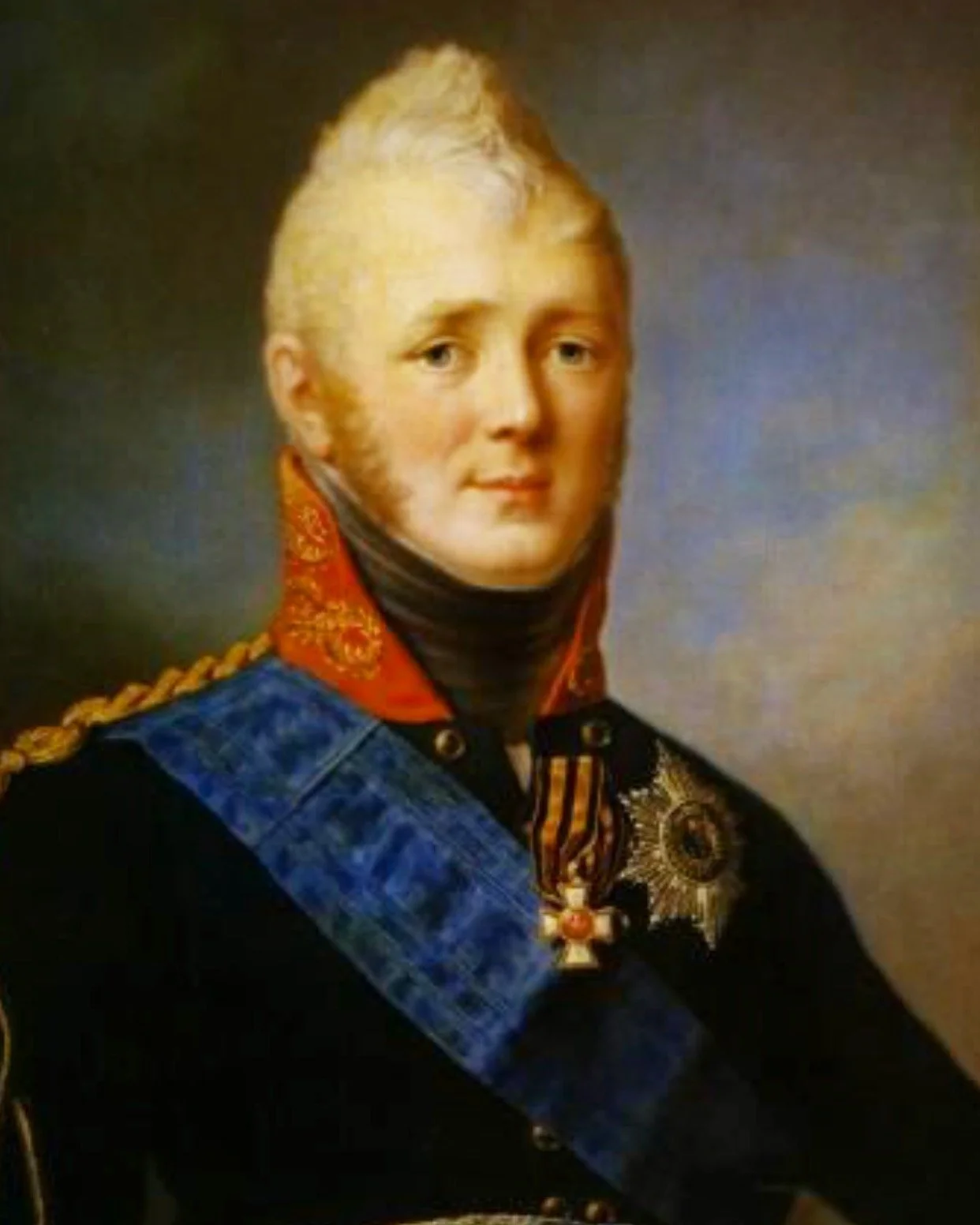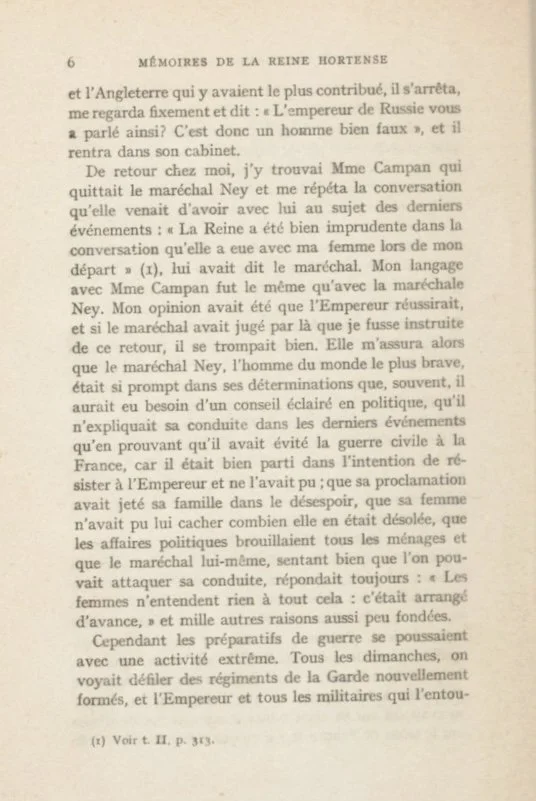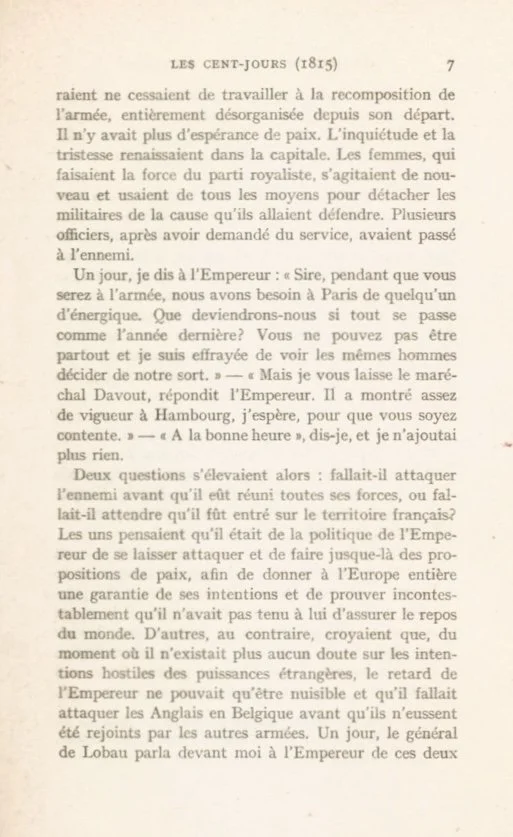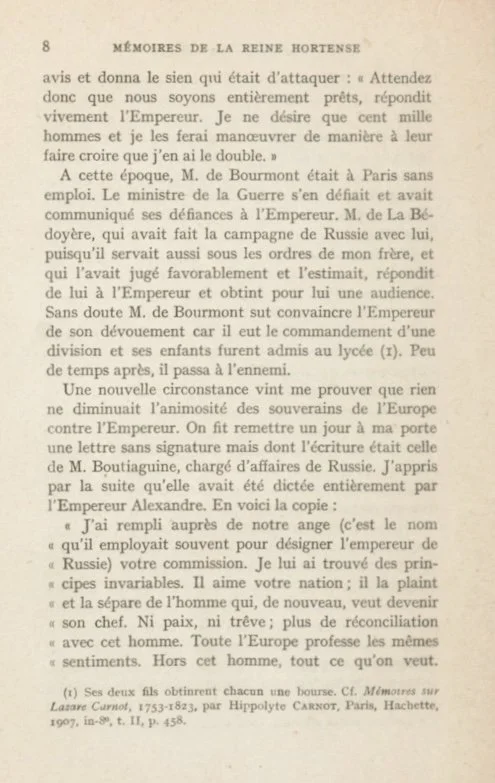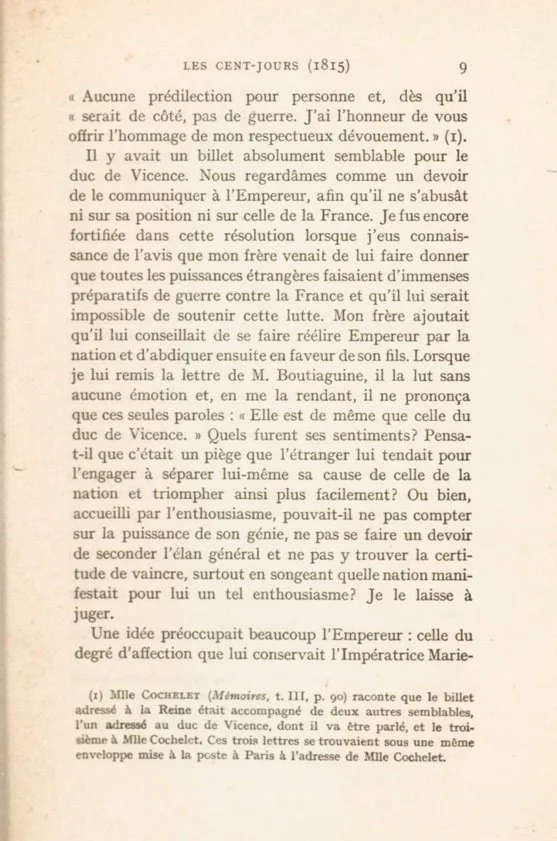Let’s have another look at Hortense’s Memoirs. If you want to read the book it is available for free at the side bar in English and French. Use the widget on the sidebar to translate the text below into pretty much any language.
I hope public is starting to figure out WHO was REALLY forcing the “Napoleonic Wars” on the people of Europe. Since that regime never got dealt with - here we are. All of us are being cornered and harmed as they did to Napoleon on St. Helena.
Hortense’s memoirs continues:
Having said this, he went back to his study. On my return home I found Madame Campan who had just left Marshal Ney. She repeated to me the conversation they had had about recent events.
“The Queen was very rash in speaking as she did to my wife when I was leaving," the Marshal had said. What I told Madame Campan was what I had told. the Marshal's wife. I had felt that the Emperor's expedition would be successful, but if the Marshal thought I spoke as I did because I possessed some special information, he was much mistaken.
She assured me that Marshal Ney, the bravest of the brave, was so hasty in his decisions that he frequently needed the advice of someone more familiar with political matters.
The only excuse for his conduct in the present instance was that he had saved the country from civil war, for he had started with the firm determination to resist the Emperor but had not been able to. His proclamation of allegiance to the Emperor had greatly upset his family, she told me, and his wife had not been able to conceal how badly she felt about his conduct.
Politics were causing trouble in many households. The Marshal himself, quite conscious that his conduct might be criticized, always replied, "The women know nothing about such things; it was all arranged beforehand," or gave some other equally futile explanation.
Meanwhile the preparations for a new campaign went forward rapidly. Every Sunday newly formed regiments of the Guard would parade through the streets.
The Emperor and all the officers about him worked unceasingly to reorganize the army which had become disorganized during his absence.
There was no longer hope of maintaining peace. Anxiety and sorrow once more filled Paris. The women who formed the backbone of the royalist party again became active and used every method to win over the officers from the cause they were about to defend.
Several officers after having asked to be sent on active service went over to the enemy. One day I said to the Emperor, "Sire, while you are with the troops, we shall need someone energetic here in Paris. What will happen if the incidents of last year repeat themselves? You cannot be everywhere at once, and I feel alarmed when I see the same men as before in command."
“But I am leaving you Marshal Davout," replied the Emperor. "He acted with sufficient energy at Hamburg, I should think, for you to feel reassured."
“Then everything will be all right," I answered. And said no more about it. Two plans were discussed. Should the enemy be attacked before they had collected all their forces or was it better to wait until they were on French soil? Some thought it better policy for the Emperor to place himself on the defensive, and until the attack was actually delivered to continue to make suggestions for peace, thus making it clear to all of Europe that he was sincerely opposed to renewed hostilities and proving he had done everything in his power to insure peace.
Others, on the contrary, felt that since there could be no doubt as to the hostile plans of the foreign powers any delay might prove a handicap and it was best to attack the English and Belgian forces before they had been reenforced by any other armies.
One day General de Lobau spoke of this to the Emperor in my presence. He declared he was in favor of attacking immediately. "Wait till we are entirely ready," answered the Emperor, hastily. "I need only a hundred thousand men and shall maneuver them so that they seem to be twice as many."
At this time Monsieur de Bourmont was in Paris without a post. The minister of war was suspicious of him and had rendered the Emperor equally suspicious.
Monsieur de La Bedoyère, who had taken part in the Russian campaign with him, since he had also served under my brother's orders, admired him, assured the Emperor that he was trustworthy and secured an audience for him.
Doubtless Monsieur de Bourmont managed to convince the Emperor of his devotion, for he was made a division commander and his children received scholarships. Shortly afterwards he went over to the enemy. A new incident occurred which proved to me that the animosity of the European monarchs in regard to the Emperor had not diminished. One day a letter was delivered at my door unsigned, but whose writing I recognized as that of Monsieur Boutiaguine, the Russian chargé d'affaires. I learned afterwards that it had been dictated, word for word, by Emperor Alexander. This is what he said I have delivered to our angel (an epithet he frequently applied to the Emperor of Russia) all your messages. I find his ideas unalterable. He loves your country and its people, he is sorry for them and separates them from the man who again has become their ruler. No peace, no truce nor any possibility of reconciliation with this man. All of Europe feels the same. Without this man any conditions you please. No favoritism toward any party, and once he is eliminated no more war. I beg to offer you the expression of my respectful devotion.
A note in exactly the same terms went to the Duc de Vicence. We considered it our duty to communicate these to the Emperor in order that he might make no mistake as to what Europe thought of him and of France. I was the more anxious to do this when I learned that my brother had just informed him of the immense preparations all the foreign powers were making to wage war against France and how impossible it would be to resist them.
My brother added that he advised him to have himself reelected Emperor and then abdicate in favor of his son. When I turned over Monsieur Boutiaguine's letter to him he read it without betraying the slightest emotion, and as he gave it back to me all he said was, "It is just the same as the one the Duc de Vicence received."
What were his real impressions? Did he imagine that it was some trap the foreign powers had set for him in order to make him separate his personal cause from the national one and thus allow them to triumph more easily? Or did he, on account of the enthusiasm which had greeted his return, feel that his genius could conquer all obstacles, that it was his duty to obey the wishes of the public, and believe he must be victorious, especially when he realized what nation it was that so expressed its faith in his power? I leave it for others to judge.
The original French is available below:

